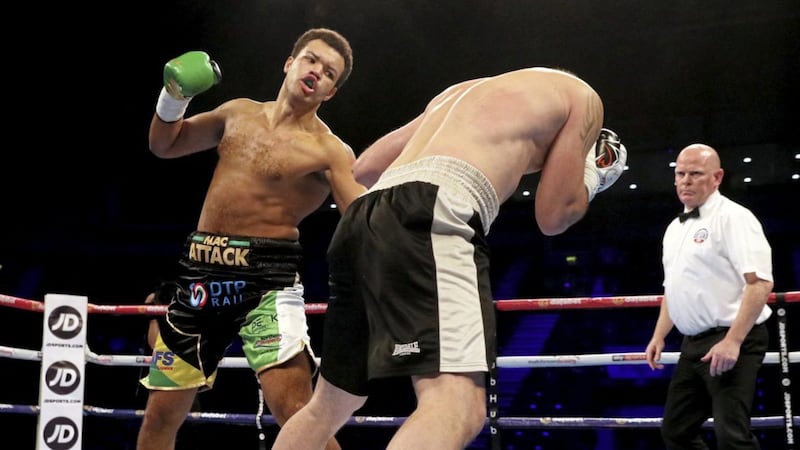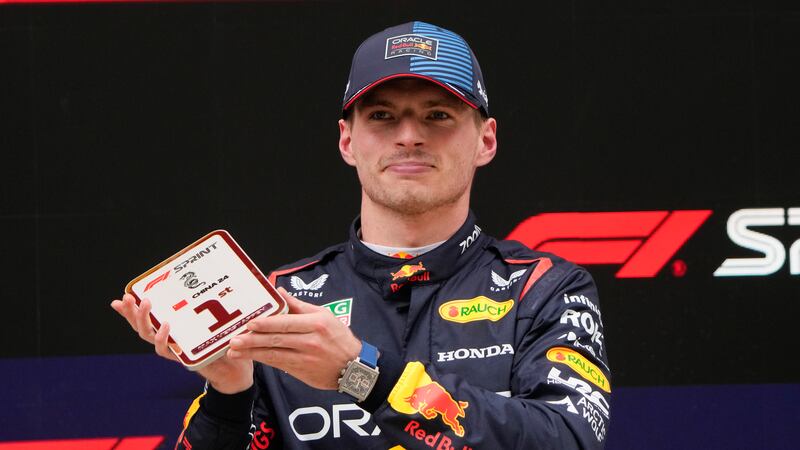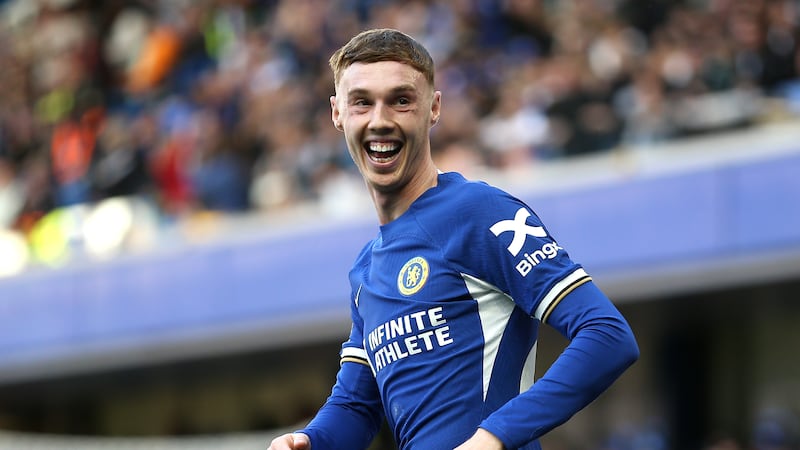HE always wanted a big family.
“I always thought: ‘When I grow up, I want to have loads of kids’,” says Tommy McCarthy.
“I have four girls but I always wanted nine.”
Nine?
“Aye, and there’s still time yet,” he adds (half-joking).
“You’re a better man than me then,” I reply (not joking).
But you can understand why he’d value the hustle and bustle of a big family because he never had it himself. Tommy had to roll with life’s punches during his own childhood and often felt like it was him against the world.
“Growing up, it was always just me,” he says.
“I’m an only child, I was always the only black person… I stood alone all the time.”
That’s why boxing, perhaps the most solitary of all sports, was the perfect fit - you can’t depend on anyone else when it's just you and the other fella in the ring.
Tonight the ring is in the Wembley Arena (on the undercard of Usyk v Chisora), the other fella is unbeaten Belgian Bilal Laggoune and the prize for the winner is the European Cruiserweight title and the world title shot that will almost certainly follow. Tommy wants that belt and it’s up to him to go out and get it.
That’s been the story of the big man’s life.
Tommy’s mum was Kim Edwards, the daughter of Windrush Generation immigrants who left Jamaica for London in the 1960s. Kim met Tom McCarthy, who’d moved from Belfast to work in the English capital, in the late 1980s and baby Tommy (named after his paternal grandfather) arrived in 1990. When his parents broke up, Tommy stayed with his mother in the heart of Tottenham’s West Indian community but he was in constant touch with the Belfast side of his family.
Tom McCarthy had made sure his son would always have a connection to his Irish roots.
“When I was three or four weeks old my daddy brought me home to get christened up in Oliver Plunkett,” Tommy explains.
“I was always going back and forward between London and Belfast in the early stages of my life. I knew that I was black, I knew I was Irish and I was proud of both.”
He’d have grown up a Londoner if tragedy hadn’t struck.
Tommy was just seven and Kim was 28 when lung disease Sarcoidosis took her from him and turned his world upside down. Twenty-three years since her passing, he holds memories of her close.
“I’m lucky that I have clear, vivid memories of me and her together,” he says.
“I think that’s the reason why I’ve never struggled with my identity, I was never longing to be like everyone else.”
He retains a very close relationship with his family in London but after Kim passed away he was plucked out of Tottenham and taken to start a new life with his dad’s family in the Lenadoon Estate in West Belfast.
Being familiar with the area meant it wasn’t the “big culture shock” you might expect but still, it took some getting used to.
“When I came over it was the tail-end of the Troubles,” he says.
“But I had already seen the Brits walking on the streets when I’d been over to visit. I had seen riots, people throwing stuff at the cops… All the madness that people outside Belfast had seen on the news, I had seen in reality so it wasn’t a shock to me as a seven year-old to come and live here.”
It wasn’t all new to him but alongside his grief for his lost mother, there was a new culture and a new accent to understand, new names to learn, new people to meet and all of them had white faces. He experienced racism, but of a “casual” kind. He was never abused or left out and although being the only black face wherever he went never sat easily with him, he says he has great memories of growing up in Belfast.
“I still live in Lenadoon and I love Lenadoon,” he says.
“I’m proud to come from and represent the area. It was just that, when I was growing up, me and another girl were the only two black kids in the whole area. When I went to primary school, I was the black person in the school and it was the same for years at secondary school.
“Even now I’m the only black person at functions and I’ve never got used to that, it’s always kind of annoyed me a wee bit. I was never bullied for being black, people never ostracised me but I always felt I was sticking out from the crowd.
“You become accustomed to, I don’t know, call it ‘casual racism’. People aren’t racist but they might say things that are (racist) and you’re thinking: ‘Does he even realise what he’s saying?’”
AS far back as he can remember, he loved boxing. The showmanship of Chris Eubank, the slick skills of Prince Naseem, the courage of Frank Bruno, the majesty of Lennox Lewis… Fighters and fights captivated him.
“Some boys following their dad or their brothers into boxing but I’m not from a boxing family,” he says.
“Back to when I was three or four, I always loved watching Chris Eubank, Prince Naseem, Frank Bruno… I just thought they were the bee’s knees. When Lennox Lewis was at his height I was P6 or P7 and I looked up to him so much.
“I used to pretend I was a boxer and I always wanted to box. I was always a boxing fan, my whole life.”
It was only a matter of time until he pulled on a pair of gloves himself and it took a chance encounter with a friend of his dad’s to start him out on the path to tonight’s fight in Wembley.
“One night, I was in first year I think, I was running home and a guy (Seamie Deeds) stopped me on Lenadoon Avenue,” he recalls.
“I had to be in for nine and it was half-nine so I was running home. Anyway he said: ‘Are you Tom’s kid? Do you want to do a bit of boxing?’ I said: ‘Yeah, yeah’ and he said: ‘Meet me here tomorrow at half-six and I’ll bring you down to the club.’
“I was buzzing. I’d never spoken to Seamie Deeds before but the next evening I went to his house and he brought me down to the club. I just loved it: The smell, the noise… Everything about it.”
In the Oliver Plunkett gym he met Eamonn Finnegan, Tyrone McKenna and Anthony Cacace and soon discovered they shared the same ambition and drive. They quickly became close friends and as he climbed the ladder, he crossed paths with other like-minded young fighters like Paddy Barnes (his mentor), Mick Conlan, Sean McComb, Tyrone McCullagh and Eamonn O’Kane.
“We all gelled together, we became a family,” he says.
“As a kid in Oliver Plunkett, you’re there five nights-a-week so I was with them every night from the age of 12 and you see them more than your family. I was in the Ireland High Performance team from 18 until I was 23 and living down in Dublin from Tuesday to Friday so the boys become like brothers. You see them at their lowest and their highest and you share your experiences. It’s a bond.”
Paddy Barnes: I first met Tommy after the Bejing Olympics. We had a training camp in Jordanstown, all the Ireland medallists were there and Tommy, Tyrone McKenna and Tyrone McCullagh were drafted onto the team.
They were messers, mucking about, putting toothpaste in people’s shoes and all sorts of crap. Some of the other boys were cracking up but I thought it was a good laugh. After that we trained together in Dublin. I used to pick him up on Tuesday mornings and bring him down and that’s how we became friends.
I had weight problems so I always used to do extra training and I used to torture him: ‘If I can throw five-punch combinations why can’t you?’ I suppose I pushed him on.
A European title is massive to have and the next one will be a world title shot. He gets this lazy-person tag because he’s so nice and laid-back, but he’s not lazy, He knows what’s at stake here and he’s left no stone unturned. I’m expecting a big performance from him.
SUCCESS followed success as an amateur. First in Belfast, then Ulster, then Ireland and he travelled the world with the Irish senior team. He won a silver medal at the Commonwealth Games in India in 2010 and then chased a spot at the London Olympics. When that didn’t happen for him, he fulfilled his lifetime ambition by becoming a professional boxer.
“From the first day I went to the gym, I wanted to be a pro,” he says.
“I didn’t have any interest in going to the Olympics or doing all the amateur stuff and I would say to Seamie and Patsy McAllister: ‘As soon as I turn 18, I’m gonna turn pro’. They used to just laugh at me but it was in my mind from I was 12.
“But I started getting amateur success and once I started doing well the Olympics becomes something real and you’re thinking: ‘Jesus, I could actually go to the Olympics’ and when you’re on the High Performance squad everything is geared towards going to the Olympics, it’s the biggest thing you could ever do with your life. There is nothing more important than being an Olympian and I fell into that kind of thinking and started working towards that but when it didn’t happen I stuck around for another year and went to the World Championships to get more experience at that level.
“Once I got the offer to go pro I was like: ‘I’m away’.”
HE got away to 8-0 and beating experienced campaigners like Conor Fry and long-term British champ Jon Lewis Dickinson pushed him into a British title eliminator against Matty Askin in November 2016.
But it was too much, too soon. A nervous McCarthy couldn’t get his feet moving or his punches off and he was dropped heavily in the fourth round. A strong heart drove him on but he didn’t get the decision.
Boxing is an unforgiving business and the loss of his unbeaten record saw him plummet from future star to forgotten man very quickly.
He fell below journeyman level to sparring partner status and spent a day short of a year out of the ring before his career was resurrected by Belfast fight manager Mark Dunlop.
Chapter two hasn’t been all plain sailing either and there was a loss to Richard Riakporhe early last year but with the experience and knowhow of Pete Taylor (father of Katie) in his corner, McCarthy produced a career-best win against unbeaten WBC International cruiserweight champion Fabio Turchi in Italy this time last year.
“That win was vindication,” he says.
“I always knew I belonged at that level and anyone who’s seen me spar, or sparred with me knows how good I am. I’d never had the opportunity to deliver and the couple of times that I did (against Askin and Riakporhe) I fell short. So to go out to Italy and win on points in Fabio’s backyard shows how well I won the fight.”
Pete Taylor: I knew Tommy from the amateurs and I always got on well with him. I thought I knew how to motivate him so I was delighted when he agreed to come down because Tommy has great potential and he hadn’t fulfilled it.
I don’t think anyone could motivate him to work hard. He didn’t like running sessions and things liked that but since he joined me, he’s got stuck into the running and done everything I asked him. It’s a long trek down from Belfast to Dublin every day but he did it religiously and that is commitment because Tommy’s a family man and he wanted to go home to his Amy and the children.
You don’t get European belts given to you but he has worked hard and I think we’ve got the right tactics to beat this lad Laggoune.
Tommy’s got the talent to give anybody trouble but we’re not looking past this one. Really, this is a world title fight for him because, if he doesn’t win, then where do we go from here?
VICTORY will be life-changing. Defeat and it could take five fights for McCarthy to get back to this position.
“There have been dark times but I never gave up on myself,” he says.
“I have the best trainer in the world in Peter Taylor. We've been working so hard in the gym and everything that was below par has been fixed.
"Laggoune has weaknesses. He's looking to go to war? I'm hoping for a first-round knockout. I've had to rebuild twice and I don't fancy doing it again. It's not going to be an easy fight but I know that I have what it takes to win."
When he’s tired and sore between the rounds tonight, Taylor will tell him that he’s got to soak it up and remind him who he’s fighting for: his wife Amy and their four girls at home.
He hasn’t got to nine yet, but it’s not just him any more.








